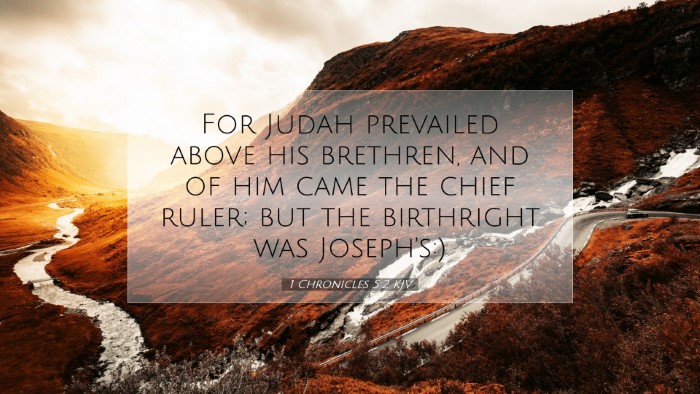Commentary on 1 Chronicles 5:2
Verse: "For Judah prevailed above his brethren, and of him came the chief ruler; but the birthright was Joseph's."
Introduction
The verse 1 Chronicles 5:2 speaks to the broader themes of tribe, leadership, and divine providence in the context of Israel’s history. It addresses the prominence of Judah among the tribes of Israel, while also acknowledging the significant role of Joseph regarding the birthright. This dual focus invites reflection on leadership, heritage, and God's sovereign plan.
Overview of Themes
- Judah's Preeminence: The significance of Judah as a leader among his brethren.
- The Birthright of Joseph: The concept of the birthright and its implications for leadership and blessing.
- Divine Sovereignty: How God's choices influence the unfolding of Israel's narrative.
Judah's Preeminence
Matthew Henry notes that Judah was granted a place of preeminence among his brothers, fulfilling God's plan for leadership within Israel. Judah’s later association as the lineage of King David and, ultimately, Christ underscores this significance. Henry points out that Judah's leadership is indicative of God's intent for the nation, as they would eventually lead in both warfare and governance.
Albert Barnes elaborates on this by indicating that despite being one of many brothers, Judah was divinely chosen for leadership due to the prophetic nature of Israel's blessings. Genesis 49:8-10 confirms that the scepter would not depart from Judah, emphasizing the everlasting rule that originates from this tribe.
The Birthright of Joseph
The concept of the birthright is critical in understanding this verse. Adam Clarke explains that Joseph received a double portion of inheritance due to his status as the firstborn of Rachel, Jacob's favored wife, which made him a prominent figure. This is particularly relevant within the historical context where birthrights often dictated familial and tribal roles within the community.
Despite Joseph's birthright, there exists an evident tension in the narrative. Henry emphasizes that while Joseph possesses the birthright, Judah’s leadership signifies God's purpose in determining who would wield authority. This exemplifies how God’s choice supersedes human tradition and expectation.
Divine Sovereignty and Human Responsibility
This verse illustrates a significant theme in biblical history: the interplay between divine sovereignty and human agency. Barnes suggests that God’s plan for Israel’s leadership showcases His authority over human decisions and lineage. Although Joseph held the birthright, God chooses Judah to lead, reaffirming the truth that God often works through unexpected means.
Clarke highlights that God's decisions often confound human logic. Judah's rise and Joseph's birthright present a dual narrative that offers insights into how God orchestrates His plans, using flawed humanity to achieve His divine purpose. This serves as a reminder that leadership within the church and community may not always align with worldly standards or expectations.
Theological Implications
1 Chronicles 5:2, therefore, speaks to contemporary readers about the nature of God's calling and the attributes of true leadership. It challenges modern believers to reconsider their metrics for leadership and influence within the church.
- The Call of God: Pastors and leaders are reminded that God's calling often comes unexpectedly and through means that may seem improbable.
- Significance of Heritage: Understanding one's spiritual heritage is vital in recognizing the implications of one's position and responsibilities in faith communities.
- Living out Leadership: A reflection on how true leadership manifests through service and humility, in contrast to the worldly views of power and authority.
Conclusion
In summary, 1 Chronicles 5:2 invites deep reflection for theologians, pastors, and students of the Bible alike. The profound truths regarding leadership, divine choice, and heritage found in this brief verse resonate through generations, reminding believers of God's sovereignty in selecting and empowering leaders. The interplay between Judah and Joseph serves as an enduring lesson on the complexities of God's divine design and the blessing of carrying forth His redemptive narrative.


